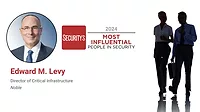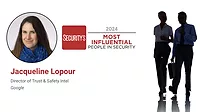Special Report
Greg Wurm, CPP | Most Influential People in Security
Vice President, Chief Security Officer | Elevance Health

Rawpixel / iStock / Getty Images Plus / via Getty Images
Bio image courtesy of Wurm
From law enforcement to healthcare security
For Greg Wurm, CPP, pursuing a career in law enforcement was a family tradition. So, when it came time for him to take his first steps into the professional world, it was only natural that he followed his father’s path and joined the St. Louis Police Department.
He served for nearly 20 years at St. Louis Police Department, where he rose to the rank of Captain of Police. Additionally, he spent two years serving as the Chief of Police at Ladue Police Department. While his career may have began in law enforcement, he soon developed an appreciation for security leaders in the corporate world.
“I was first interested in security because I was impressed by the professionals in corporate roles,” Wurm reflects. “Those people would come and visit me at the police departments, talking about some of the senior executives that lived in my jurisdiction and the assistance that they could offer to me. I became intrigued by that and the line of work they did.”
Impressed by the corporate security industry, Wurm anticipated joining the private sector toward the end of his career. However, he soon got an opportunity he couldn’t refuse.
“It was during my time as police chief that I was contacted by a large, growing corporate office in St. Louis, asking me about coming in and taking over the role as the lead for their security department.”
Wurm accepted the offer, joining Centene Corporation as the Vice President, Security & Facilities. Although several other corporate security positions followed after this, Wurm believes that this role paved the way to obtaining his current position as Vice President, Chief Security Officer at Elevance Health.
Wurm contemplates his favorite aspect of his current role, stating, “One of the things I like most about my role is that it changes from day to day. There is no typical day. There's a different set of challenges every day, and even though we apply some of our basic concepts and principles to how we deal with the situation, each one presents its own little twist that requires a different approach.”
One of the things I like most about my role is that it changes from day to day. There is no typical day.
There are unique challenges that Wurm faces as a security leader in the healthcare industry. “In security, we don’t always have an immediate response from local law enforcement, or we don't always have resources available to us to quickly handle these things. So, we've had to find solutions ourselves on how to deescalate situations and how to try to resolve problems that may not have been part of the scope of work for people in the roles prior.”
Another challenge Wurm faces in the healthcare industry is ensuring the patient experience is unimpeded while maintaining a secure environment.
Elaborating on these challenges, Wurm says, “I think the challenge for us is finding the balance between having an open environment where patients need to come in for treatments and services and that need to protect and sometimes isolate our associates from people who are there that may want to cause harm.”
Nonetheless, Wurm’s background in law enforcement has equipped him with the necessary skills to confront these challenges.
“My background in law enforcement provided me with the fundamental tools and the networking capabilities that I needed to be successful in a corporate security role,” Wurm says.
These tools and networking abilities led Wurm to what he considers his greatest career accomplishment so far. “I think the thing I'm most proud of is the team that we've built. We brought on a lot of really good talents over the years and been able to retain them. It's a group that's really good at handling at these issues, and I think they're really geared up for tomorrow's challenges.”
In addition to the pride he has for his team, Wurm derives fulfillment from his ability to help others.
“I think my favorite part is to have an impactful solution for people's problems,” Wurm says. “One of my favorite parts is just being able to provide the level of service needed so people feel comfortable coming to work.”
Looking for a reprint of this article?
From high-res PDFs to custom plaques, order your copy today!







